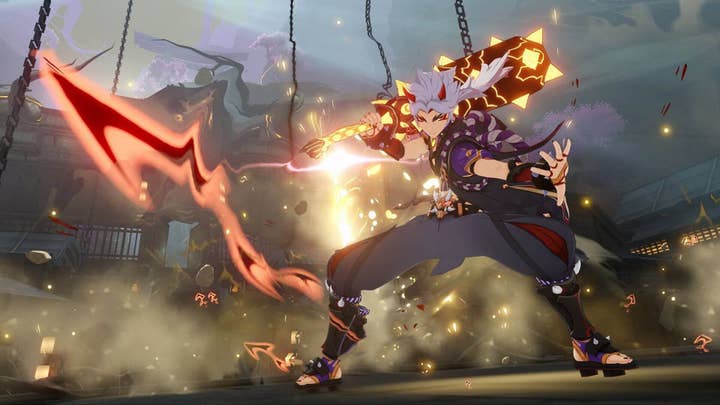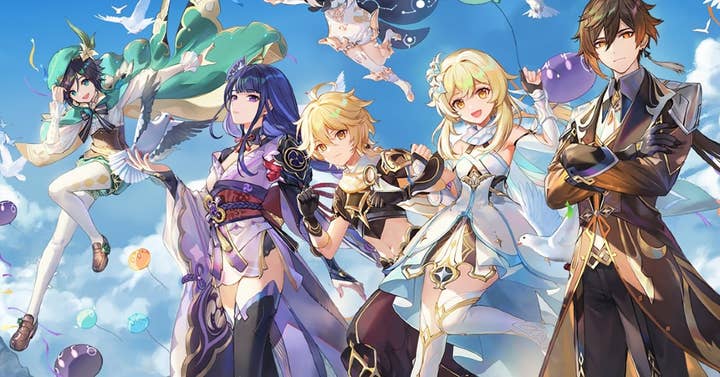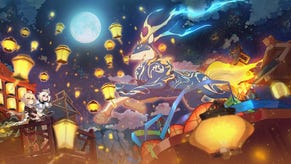The voice actors' strike shows its claws | Opinion
With Hoyoverse forced to launch Genshin Impact content without English voices, the "canary in the coalmine" for AI strip-mining of creative talents continues singing
It may have fallen out of the public consciousness a little bit since it began at the end of July, but the strike action by video game voice actors in the SAG-AFTRA union remains very much active. A picket was held at Electronic Arts' studio in Los Angeles this week – but arguably much more impactful, at least in terms of widespread attention for the strike, was the launch on Wednesday of the latest major update to the immensely successful Genshin Impact.
The update, which brought with it several hours of new main storyline quests, arrived with one quite jarring omission: two of the central characters in the current arc of the story are missing English-voiced dialogue, making this the first noticeable impact that the strike has had on a major shipping title.
Genshin Impact is exactly the kind of title that really ends up in the crosshairs of this kind of strike action, much like how regular episodic TV suffers the most from strikes in that industry. As a live-service game whose updates are expected to bring large amounts of story content, it has to produce a huge amount of voiced dialogue in multiple languages on a relatively short and inflexible timescale.
A more monolithic title could work around a strike to some extent, but Genshin lacks flexibility not only in terms of timing but also in terms of which actors they use. Players will definitely notice if fan-favourite characters are suddenly voiced by a different actor in a new patch – we know they'll notice, because they certainly made their feelings very clear on the handful of occasions where this has been unavoidable in the past for various reasons.
In the current situation – which, according to IGN's reporting, stems from one of several studios Genshin Impact uses for voice acting having failed to come to an agreement regarding the strike – developer Hoyoverse was left with few options, and no good ones.
It may only be one case, but it does demonstrate that the strike has claws; if a company with the scale and resources of Hoyoverse finds itself reduced to apologising to players and releasing content without voiced dialogue, we can only imagine how much difficulty the strike is causing behind the scenes at other studios. It's reasonable to sympathise what those trying to work through that chaos, but that, of course, is what a strike is meant to cause; if withdrawing labour didn't cause chaos, there would be no value to it (quite the opposite, since it would prove that the labour was of minimal value to begin with).
If a company with the scale and resources of Hoyoverse finds itself releasing content without voiced dialogue, we can only imagine how much difficulty the strike is causing behind the scenes at other studios
The value that good voice acting brings to games isn't really up for debate; there's a reason why the transition point where game dialogue went from being mostly text to being fully voiced was such an exciting point for creators and players alike. We know that players identify voice actors with key characters very deeply, to the extent that the recasting of such characters in games like Bayonetta 3 and Metal Gear Solid 5 has often been controversial and divisive, and poor voice acting – often a result of it being rushed or under-budgeted – is something players pick up on very critically.
For all the debates over and back about various aspects of videogame graphics – resolution, framerate, pop-in, and so on – there is a quiet undercurrent of understanding that a large proportion of the audience doesn't actually notice these aspects to a great degree. Bad or inconsistent voice acting, though, seems to be almost universally jarring.
That, of course, is why there's such a serious dispute happening right now – everyone recognises the incredible value that good-quality voice acting brings to games, but some companies can't help but dream dystopian little dreams about not having to pay for it any more. The dispute over AI in this field is relevant for the entire industry; what happens to voice actors in this dispute will eventually happen to every kind of creative talent involved in the making of games, so the precedent set here should be watched very closely indeed – and anyone whose creative work ends up in a videogame, whether it's art, animation, 3D models, writing, or any other form of creative output – should be full-throated in their support of the actors.
It's worth stepping back for a second, though, to take a little dose of realism about what's actually possible with AI voice acting. Yes, you can train a "deep fake" voice that sounds eerily like the original actor – the right to do that is what is being disputed here. You cannot, however, train an AI to produce a nuanced, interesting performance of a character. That's not what AI does or how it works.

At best, you gain the ability to have a different actor's voice be altered to sound like the original actor, but the AI model which accomplishes this knows nothing about the creative choices the original actor would have made about their character, about the emotions and nuances that would have enlivened their line readings, or about their creative interactions with the scriptwriters and directors. You can 3D print a death mask of a famous actor and stick it to a mannequin, but you can't expect to then throw it in front of a camera and have it deliver an Oscar-worthy performance.
That we're even having this dispute at all really speaks to the fact that a lot of people are entranced by AI buzzwords without having a particularly clear understanding of the potential and limitations of the technology; and that a lot of the same people don't really have a deep understanding of how the creative processes they supposedly manage and oversee actually function. Yet even if the notion of cloning actors' voices digitally and using them to reduce costs in future recordings isn't going to work in most cases, it's still a concept that has the potential to do vast damage.
Studios having the capacity to replace background and ancillary voice work with AI so that they only have to record real human actors for lead characters, for example, would slash out most of the "bread and butter" work that keeps voice acting a sustainable career, and remove the pipeline that less experienced actors come up through before winning more high-profile roles.
You can 3D print a death mask of a famous actor and stick it to a mannequin, but you can't expect to then throw it in front of a camera and have it deliver an Oscar-worthy performance
For an industry that's constantly complaining about the difficulty of attracting and retaining talent across a wide range of creative and technical roles, steam-rollering the talent pipeline for a whole swathe of those roles shouldn't be done quite so casually. That's even before we consider how flat, boring, and repetitive this kind of background dialogue – which so often makes games really sparkle and feel realistic and lived-in – will be if it's all being churned out by AI, which is at best merely a system for making collages of existing creative material.
Ultimately, even leaving aside business considerations, there is a basic moral issue in play here. A voice actor's voice is, as the name of their profession suggests, the absolute key asset in their career; it is simply a moral imperative that they be able to retain control and ownership of that asset to the greatest extent possible. Pushing for clauses that strip such ownership to be boilerplate language in contracts is nothing short of dystopian, and every other creative professional has to recognise that voice actors are just the canary in the coalmine here; if ownership of their voices can be taken so easily, you may be certain that companies will assert similar rights to make pale and colourless digital facsimiles of every other creative skill as well.
The fear is all the greater because, frankly, we know that many of the people who will be making such decisions have never shown themselves to have much understanding or insight into the quality of games or of creative works in general; if the notion that AI copies of creative output are "good enough" gets embedded in that managerial class and permitted to spread, the overall loss of – of jobs, of creativity, of originality, and ultimately of an entire medium worth engaging with – will be immeasurable.




